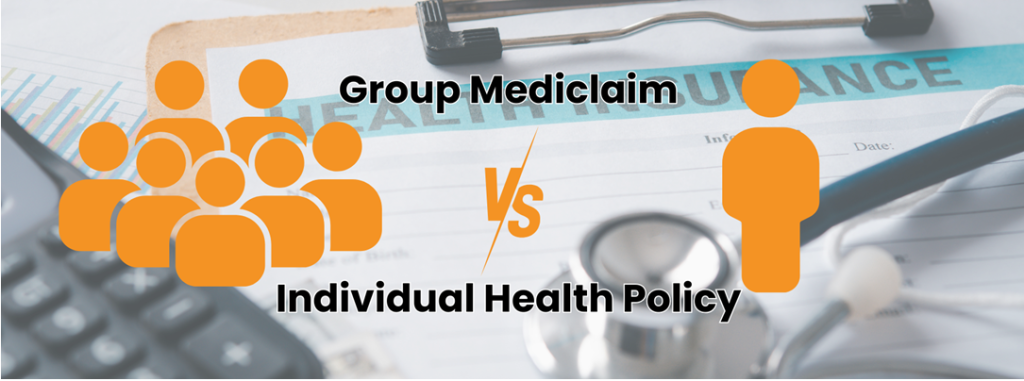In today’s fast-paced corporate world, employee well-being is becoming as important as productivity and performance. One of the most effective ways companies support their workforce is through health insurance benefits. In India, most mid-sized and large companies offer a Group Mediclaim Policy (GMC) to their employees, while individuals also have the choice of buying their own Individual Health Insurance Policy.
At first glance, both policies may look similar since they cover hospitalization and medical expenses. However, the scope, flexibility, and long-term value of each policy differ significantly. To make the best choice, employees need to understand how these policies work and whether relying only on employer-provided insurance is enough.
What is Group Mediclaim Insurance?
A Group Mediclaim Policy is an umbrella health insurance plan purchased by an employer to cover all employees under a single master policy. The premium is either:
Entirely paid by the employer, or Shared between the employer and employee as part of a benefits package.
Example: If your company provides a ₹5 lakh cover, you and your dependents (spouse, children, sometimes parents) can use it for hospitalization expenses, surgeries, or treatments.
Benefits of Group Mediclaim:
Immediate Coverage: No waiting periods, meaning pre-existing diseases, maternity, and certain conditions are covered from Day 1.
Cashless Treatment: Employees can access network hospitals without upfront payment.
Family Coverage: Dependents like spouse and children are usually included at no or minimal extra cost.
Employee Retention Tool: Companies use it to improve job satisfaction and loyalty.
However, the sum insured is often limited (₹3–5 lakh on average), which may not be sufficient for critical illnesses or multiple hospitalizations in a year.
What is an Individual Health Policy?
An Individual Health Insurance Policy is a personalized plan purchased directly from an insurance company. Unlike group policies, this is independent of your employment status.
Example: A 30-year-old employee may purchase a ₹10 lakh health cover for themselves and their spouse. Over time, they can increase the sum insured and add riders as per their needs.
Benefits of Individual Policy:
Customizable Coverage: Choose the sum insured, riders, and type of plan (family floater, top-up, critical illness, etc.).
Continuity: Coverage remains intact even if you change jobs, retire, or take a career break.
Tax Savings: Premiums are eligible for deduction under Section 80D of the Income Tax Act (up to ₹25,000 annually, and ₹50,000 for senior citizens).
Long-Term Security: Buying early ensures lower premiums and that waiting periods are completed by the time health risks increase.
The only downside is the cost—since individuals bear the full premium, it’s more expensive than group mediclaim.
Group Mediclaim vs Individual Health Policy
Here’s a detailed comparison of the two:
| Aspect | Group Mediclaim (Employer) | Individual Policy (Self) |
| Premium Cost | Free or subsidized by employer | Paid by individual (higher if older or with pre-existing diseases) |
| Coverage Amount | Usually limited (₹3–5 lakh) | Flexible; can go up to ₹25–50 lakh+ |
| Pre-Existing Diseases | Covered from Day 1 | Covered after 2–4 years waiting period |
| Job Dependency | Ends with job change or retirement | Independent of job; lifelong renewable |
| Family Members Covered | Usually spouse, kids, sometimes parents | Fully customizable (parents, spouse, kids, siblings) |
| Tax Benefit | No personal benefit | Section 80D deduction available |
| Flexibility | Employer decides coverage and features | Policyholder decides coverage, add-ons, riders |
Best Strategy for Employees in India
Don’t rely only on Group Mediclaim.
If you change jobs, resign, or retire, your group coverage stops immediately. Imagine facing a medical emergency during a job switch—without your own policy, you’re at financial risk.
Buy an Individual Health Policy Early.
Starting young means lower premiums, and waiting periods for pre-existing conditions are cleared by the time you may actually need the coverage.
Use a Combination.
The smartest approach is to use Group Mediclaim as your first line of defense (since it’s free or low cost) and back it up with a robust Individual Health Policy. This way, you get both affordability and long-term security.
Top-Up Policies.
Employees can also add a Super Top-Up plan to their individual cover, ensuring large claims are covered without paying very high premiums.
Conclusion
For Indian employees, Group Mediclaim is a great short-term benefit, but it has clear limitations. On the other hand, an Individual Health Policy provides long-term financial protection, flexibility, and independence.
The ideal approach?
Use your Group Mediclaim as a cost-effective base policy while investing in your own Individual Health Policy for long-term health security and tax savings. This combination ensures you and your family are protected both during your working years and beyond.
Need help understanding insurance
Consult us.
Email: info@insuranzee.com
Contact +91-9202677297

